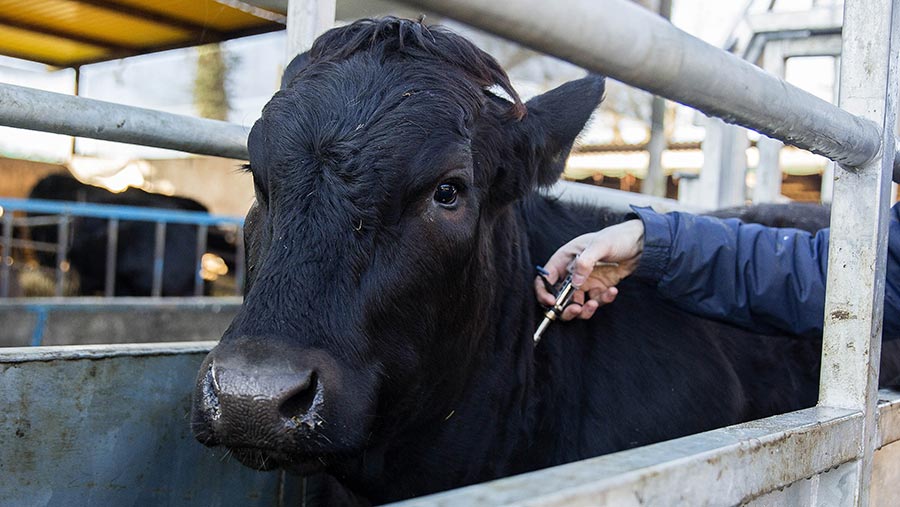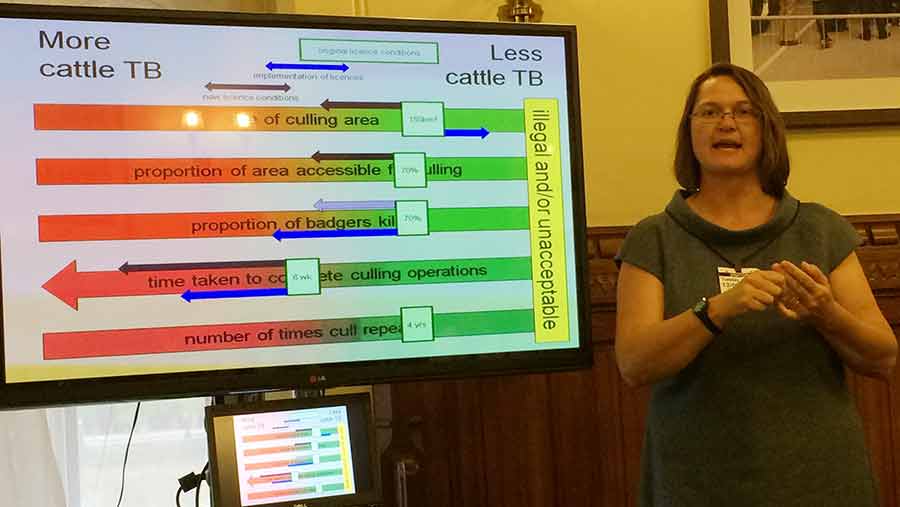‘TB supremo needed’ to eradicate bovine TB
 A cow being tested for TB © David Hartley/REX/Shutterstock
A cow being tested for TB © David Hartley/REX/Shutterstock New prime minister Theresa May has been urged to adopt a national strategy and recruit a “TB supremo” to inform government policy to help eradicate bovine TB.
John Bourne, who oversaw the £50m Labour government-funded Randomised Badger Culling Trial (RBCT) between 1997 and 2008, said the government should appoint a “TB supremo with a small team of between three to five people”.
This expert person and the team would stand independently of government and be allowed to “just get on and do the job” of informing government on its TB policy decisions.
“We will eradicate TB in 25 years? Not a hope in hell. We just can’t. There is too much infection in the countryside”
John Bourne
See also: More badger culls planned this summer, says Defra minister
Prof Bourne warned that Defra “hadn’t a hope in hell” of eradicating TB in the next 25 years with its current plans.
There was more chance of the England football team winning a World Cup over the next six tournaments, he suggested.
He accused Defra ministers of overseeing a “piecemeal” and “tactical” TB policy which had “no strategic plan”.
“We will eradicate TB in 25 years? Not a hope in hell,” said Prof Bourne. “We just can’t. There is too much infection in the countryside.
“But what one can do, with a well-thought-through strategy that controls animal movements and includes sensible use of the tools available, can seriously reduce that disease over a 10-year period.”
TB skin test ‘inadequate’
Cattle-to-cattle transmission of disease within herds was the biggest factor for new TB outbreaks, he said. But the current TB tuberculin skin test was “inadequate” because it left too many diseased cattle in herds with multiple breakdowns.
He urged Mrs May to adopt a “national strategy” on bovine TB, based on risk-based trading that must involve increased biosecurity, which farmers must be made to comply with as a statutory requirement.
Prof Bourne joined other wildlife experts who delivered testimonies for and against culling badgers at a press briefing at Westminster hosted by Queen guitarist and anti-cull campaigner Brian May on Tuesday (12 July).
Professor Rosie Woodroffe, a senior research fellow at London’s Institute of Zoology, warned that the current badger control licence conditions, which include “free shooting” of badgers, were unlikely to deliver effective culls.
She said the pilot culls had not succeeded in removing enough badgers and risked spreading disease further.

Rosie Woodroffe
RBCT trial results
Prof Woodroffe said the RBCT trial had shown that in 10 areas where badger density was reduced by about 70%, confirmed cattle TB cases went down by about one-quarter.
However, in areas outside the culling zones where there had been about a 20% reduction in badger numbers, the trial showed there had been a 25% increase in cattle TB cases.
She put this down to the “perturbation effect” of badgers fleeing cull zones and spreading disease further.
“If you are not reducing the badger numbers enough, you end up with a benefit inside and a harmful effect on the adjoining land.”
Ranald Munro, chairman of the independent expert panel that oversaw the culls in 2013, said badger culling was a “distraction” from the main issue of controlling TB infection within and between cattle herds.
The pilot culls in Gloucestershire and Somerset are due to enter the final year of a four-year licence this summer; and the four-year cull in Dorset will enter its second year.
Cull extension considered
However, Natural England is currently assessing 29 farmer-led applications to extend culling to more counties in England as part of efforts to tackle bovine TB in herds.
Plans to roll out the cull in the late summer/early autumn to six new counties – Cheshire, Devon, Cornwall, Herefordshire, Wiltshire and Worcestershire – are under consideration.
A Defra spokesman said: “England has the highest incidence of TB in Europe and that is why we are taking strong action to deliver our 25-year strategy to eradicate the disease and protect the future of our dairy and beef industries.
“Badger control in areas where TB is rife is one part of our long-term plan, which also includes strengthening cattle testing and movement controls, improving biosecurity on farm and when trading, and badger vaccination.
“This comprehensive approach has worked overseas and is supported by the government and Defra chief scientists and leading vets.”
